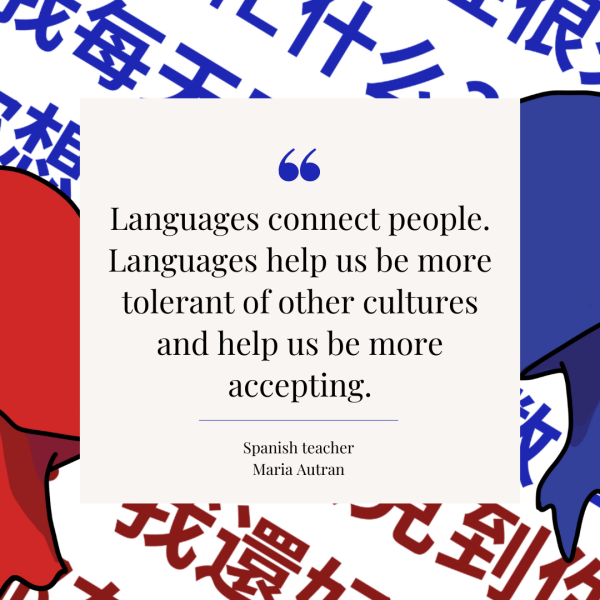Having spent most of her life in China, junior Lindsey Niu was fluent in Chinese long before she set foot into Advanced Placement Chinese for the first time. Despite coming into class with a far deeper knowledge of the language and culture than most of her peers, Niu still found every class interesting – AP Chinese even became Niu’s favorite class, which she attributed to finding enjoyment from helping other students as well as the class’s engaging learning style.
Maria Autran and Joyce Fortune, both Spanish teachers at MVHS, also aim to make class interesting for all students, regardless of their level. The goals of the Spanish language program include not only preparing students for the AP exam, but also enabling students to hold conversations in Spanish-speaking countries.
“You have some students who want to be a doctor, those that want to travel, and some who just want to get two years so they can go to college,” Fortune said. “I want to build their vocabulary, practice their grammar and build their skills so that I can send them on to the AP class, but that’s not my primary goal and it shouldn’t be anyone’s primary goal either.”
Although the AP exam in May marks the end of some students’ Spanish journeys, many students have found real life applications for the language. While Niu says the Chinese she learned in her AP Chinese class is useful for people wishing to travel to China, the Chinese they learn is limited to travels and not extended stays.
“If you were in China, you’d be able to use the Chinese taught in the AP classes. But in reality that’s not how a teenager in a public high school would talk,” Niu said. “People are always using slang. They won’t talk like they would if they were in the Chinese class, because it’s just too boring for a high schooler, for a teenager.”
To Niu, subtleties like these often distinguish native speakers from non-native speakers, accentuating the qualities of a different upbringing and heritage. Despite this, Autran strongly believes that the content and skills covered in her class will prepare her students to overcome such challenges and to embrace the diversity of not knowing another particular dialect.
“To go out there and explore any Spanish speaking country, there’s varieties of vocabulary,” Autran said. “Even I wouldn’t completely understand someone from Chile, maybe, but everybody will face that. Even as you travel to different countries, you’ll realize that vocab varies. Even native speakers have to struggle with that. For instance, in Mexico, we say the word for the bus is ‘el camión’ or ‘el autobús,’ but maybe in some Caribbean countries, they say ‘el guagua.’”

Due to any culture’s vastness as well as its ever-changing nature, Autran acknowledges that it can be difficult to teach and correctly represent in a classroom. Niu agrees and says as a result, topics relating to culture in AP classrooms fail to depict the personal and individual experience, which threatens the distinction between customs and stereotypes.
“Sure, AP Chinese covers Chinese culture, and it lets you have a basic view of Chinese culture as a whole,” Niu said. “But Chinese culture doesn’t have a specific shape. For example, the AP classroom teaches that Chinese people always pretend to be humble, or they’re actually humble, that they won’t accept praise. But for many Chinese people, like me, I don’t want to be humble at all. I would like people to just praise me, and I encourage them to praise me because I like to hear it.”
Autran believes some of the content she teaches from the textbook is outdated, leading her to supplement textbook readings along with online articles. She further explains that the importance of current and modern events is their ability to develop and shape culture – a tool not only used to connect with others in a community but also to instill appreciation for language among kids.

“Kids that are in AP or higher language levels already value the importance of knowing another language,” Autran said. “But I wish we started earlier, even before high school, helping kids understand why knowing other languages could benefit them in the long run and benefit their communities. I wish we could instill this love for language and tell kids that it is valuable beyond the classroom. Languages connect people. Languages help us be more tolerant of other cultures and help us be more accepting.”













